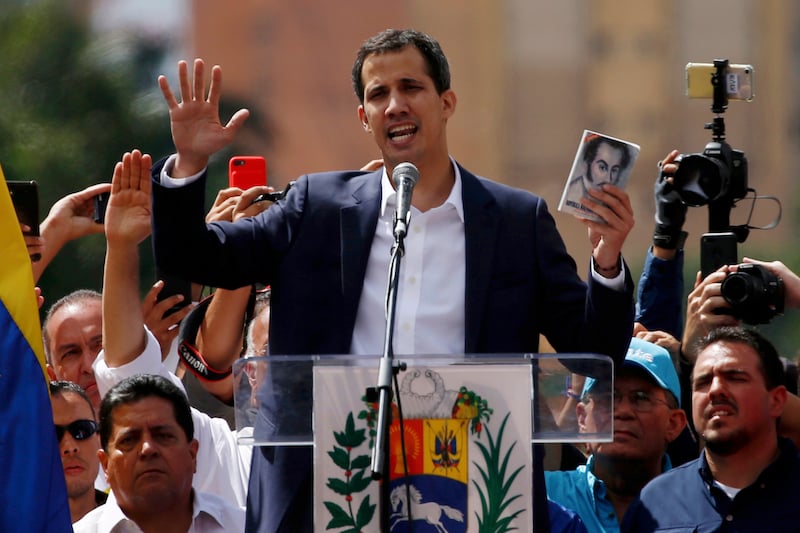WASHINGTON (CN) – More sanctions are coming for banks that support Venezuelan President Nicolas Maduro, a team of foreign relations experts told lawmakers Thursday.
“Only the Maduro regime is denying humanitarian aid, shooting at workers and using food and medicine as a tool for social control,” U.S. Special Representative for Venezuela Elliot Abrams said this morning at a hearing of the Senate Foreign Relations Committee.
The message before Congress echoes one by national security adviser John Bolton, who in an official statement released Wednesday by the White House purported to put foreign banks supporting Maduro “on notice.”
Abrams said cutting off the socialist leader’s cash flow is hoped to drive him out, allowing opposition leader Juan Guaido to step in as Venezuela’s interim president.
Maduro’s senior officials already face dozens of visa restrictions for their part in prohibiting the delivery of medicine and food into the country last month.
The delivery of rice, beans, sugar, salt and other necessities was coordinated by Guaido and other nations, including the U.S., who back his claim to the presidency. As the truck prepared to cross the border from Colombia to Venezuela, however, it was burned by Maduro forces.
The conflagration spurred violence between protestors and soldiers at the border but also provided Guaido a chance to go on the offensive, telling reporters Maduro “doesn’t care about Venezuela” since he chose to burn “food for the hungry and medicine in front of the sick.”
“He has chosen the worst of paths, the path of crime and extermination,” Guaido said.
Mark Green, the administrator of U.S. Agency for International Development, told lawmakers the humanitarian crisis in Venezuela continues to grow. On average, he noted, Venezuelans are losing 24 pounds per year as food grows scarcer and diseases or infections, like diphtheria, spike.

The instability in the region has also prompted an exodus: roughly 3 million Venezuelans have fled the country and are crossing the border into neighboring Colombia or seeking refuge in places like the United States.
Senator Ben Cardin, D-Md., pressed Abrams Thursday for his insight into the Trump administration’s plans for how to welcome those who flee Venezuela and attempt to seek asylum in the United States.
“We have a policy under review right now,” Abrams said. “There are 74,000 asylum applications from Venezuela alone.”
But with tensions mounting daily in Venezuela, Cardin emphasized the need for urgency and told Abrams he was “puzzled” as to what, specifically, about the asylum applications was under the administration’s review.
Abrams offered a murky answer, saying only that those asylum applicants would continue to be reviewed.
“Clarity here is extremely important … our actions will be judged very much by what we do,” Cardin said. “And when you say it’s under consideration, that tells me that we are not acting in a timely way. That presents a challenge to everyone, including for the U.S. and our leadership in that region.”
The true intent of U.S. action in Venezuela was also a subject of much concern for Senator Tim Kaine.
President Trump has refused to plainly rule out the possible use of military force to oust Maduro, a maneuver that would have significant impact not just in the region but globally.
“The president’s comments about a military threat are a terrible idea,” said Kaine, a Virginia Democrat. “There’s already too much discussion of “imperialist Yankees” and this creates a problem if that message gets mixed with a potential military threat.”
Loose talk about military action effectively “cements and emboldens” dictators who “want to blame their problems on Uncle Sam,” he said.
The U.S. must stress that its only interest in Venezuela is for peace, liberty and democracy.
“Not the military, not oil. Nothing we want for ourselves. Just peace for the Venezuelan people,” Kaine said.
Both Abrams and Green agreed that caution is needed with war-like rhetoric. Abrams also noted that — while backing U.S. support of Guaido has gained popularity and spread to more than 50 countries, including in Latin America — other valuable allies have not openly come to support the ousting of Maduro.
In particular, Green said the United States is looking to political leaders in the Caribbean for support. In Trinidad and Tobago, where hundreds of Venezuelans have fled, the U.S. just committed to providing $1.6 million in assistance to help the island nation handle the influx.
“The impact of Venezuelan flight in the Caribbean isn’t something people quite appreciate yet,” Green said. “We started to hear concern last year and now the numbers have climbed upward.”
The committee will meet soon with Abrams in a classified setting to discuss the next steps for U.S. actions in Venezuela.
Subscribe to Closing Arguments
Sign up for new weekly newsletter Closing Arguments to get the latest about ongoing trials, major litigation and hot cases and rulings in courthouses around the U.S. and the world.








